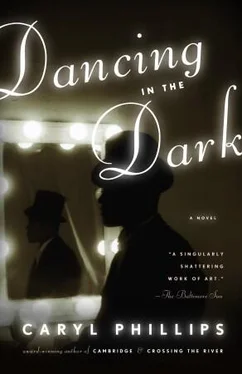Sitting across the table from him at a fine restaurant on Fiftythird Street, Lottie melts. But he does not blow any hot air on her. He just listens to what she has to say about her late husband’s painful final days in Chicago, and he drinks up her words as though they were the finest red wine. She is helpless in the face of his stillness. He is balanced, and he seems to understand that the first duty of love is to listen. She looks closely at his hands, for she knows that gentle hands that are afraid of loss are the only hands for her. Lottie wishes to apologize for her somewhat coy behavior at the photographer’s studio, but saying sorry seems unnecessary. She toys with her food while, inside of her, certainty falls like an anchor.
He insists on walking her the four blocks back to her rooming house on Forty-ninth Street, and as they step out of the restaurant he offers her his arm. They ignore the unsavory odors that emanate hereabouts from dark hallways and open windows, and they promenade regally as though crossing a meadow that is high with the scent of flowers on a bright spring morning. He tells her that there is no other girl; that there has never been another girl, that his life has been selfishly dedicated to performing, but now he is ready for something else. He confesses that her quiet dignity has captured his heart and he wonders if she might consider hitching her fortune to his. She smiles coyly and suddenly he feels overwhelmed with embarrassment. As they reach the junction at Fifty-first Street and Broadway they both hear the word “niggers” fly from a horse-drawn carriage, but neither looks up to investigate what foul mouth has unleashed this missile. The word ricochets off a wall and crosses in front of them, creating a low obstacle over which they both step. They do so without breaking stride and press on toward Lottie’s place of residence. Were they to turn around they would still see the word hurtling around the junction of Fifty-first Street and Broadway, picking up speed here, losing tempo there, as purposefully silent as a bird’s flight, yet furiously burning energy deep into the New York night.
Before she retires Lottie lights a solitary candle and then kneels by the side of her bed. As the scarf of smoke eddies its way toward the ceiling in swirling fits and starts, she begins to recite her cherished list of names. Her dry lips peel stubbornly apart, and as she whispers the names her now freshly moistened lips brush gently, one against the other. She squeezes her hands together and adds one more name. But what to call him? Mr. Williams? Perhaps she should have given him the opportunity of naming himself, but she knows that Mr. Williams is not this type of a man. “Call me the Honey Man.” “They call me Sweet Loving.” “Let me be your daddy.” For most of her years on the stage she has heard this kind of sweet talk, and a ring, bold and visible on her left hand, has never stopped a man’s tongue from flapping. “Baby, they call me the Candy Man.” But this man, whose head fame has not yet managed to turn, seems to have no desire to rename himself. She continues to kneel by the side of her bed.
Sitting high up in the balcony with the colored folks, she watches tall, twenty-six-year-old Mr. Williams perform with his partner. Two Real Coons whooping it up on the New York stage, and a shiver of pride runs through her body. Women of all shades, from nearly night to nearly day, are captivated by the sight of Mr. Walker all prettified in his spats and his vest and his trim jacket, and each evening these ladies return in order to enjoy the thrill of being under the same roof as Jim Dandy. Lottie looks at these women and understands that while they respect the taller man, he can never generate the same heat in their hearts, which pleases Lottie for she knows that some women possess appetites that are dangerous to men. Again Lottie looks at Mr. Williams. Hers is a private passion, studying how he moves, how a raised eyebrow here and a turn of the wrist there make the white folks downstairs collapse into heaps of laughter. They laugh at him, and they feel sorry for him, but she understands that they are laughing at somebody else. This is not the dignified man that she knows, and so she too is permitted to laugh. However, the sight of her suitor in corkface disturbs something in her soul. But there is nobody to whom she might turn and quietly confess her anxieties, sitting high up in the balcony with the colored folks.
While his darker partner drank and smoked late into the night, and decided which of his female entourage he should entertain, Bert would have long ago proffered his excuses and climbed the stairs and made his deliberate way up to his single bed at the back of Marshall’s Hotel on Fifty-third Street between Sixth and Seventh Avenues. Once there he would first draw the drapes and then slowly contemplate undressing. Each article of clothing was neatly folded and hung on a wooden hanger, and then his long extravagant shoes were carefully lined up, one next to the other. Only then would Bert slide into the white rectangular pocket and prop himself up and read from his extensive book collection. Much to his father’s chagrin, Leland Stanford’s institution was already a past dream, but Bert refused to abandon the quest for self-improvement. Philosophy, history, science, he read books on whatever subjects took his interest, but eventually the tension of the day would take its toll, and Bert would prudently mark his place and then rest his book back on the bedside table. For a few moments he would lie with his eyes open, staring at the ceiling, dreaming of songs yet to be written, keen to improve his mime skills and hone his voice, eager to be recognized. The whole world lay before him and Lady Luck had dealt him a fine hand for he truly believed that he was in the right city at the right time. He believed that if both he and George stepped cautiously, and kept moving forward, then the theater might well be kind to them, but of late he worried about George for he appeared to be growing increasingly impatient. In all the time that they had lived and worked together as brothers, he had never once seen George back down in an argument or turn from a fight, and now, as their fame as the Two Real Coons was beginning to quicken, George seemed to be reveling in the attention. Bert knew that his partner would be downstairs in Marshall’s Lounge drinking with Bob Cole, whose performances as “Nigger Bob with chitlin’-loving eyes” marked him out as one of the crude minstrels whom George professed to despise. However, offstage they remained firm friends, and the pair of them often stayed in Marshall’s Lounge until dawn, leaving only to scamper upstairs and swiftly entertain one of the many devotees who the pair of them traded like used banknotes. The talk that reached Bert’s ears was not good, for these women were obviously low-grade fruit that would fall with little shaking, but this was not a subject to broach with George. He knew that his partner would not care to discuss his addiction to fine women and new money, but clearly he was happy, for, these days, whenever George climbed to his feet it was noticeable that one buttock was heavily swollen with a roll of dollar bills. Bert reached over and turned off the bedside lamp. George must live his life according to his own plans, and if this involved his sitting downstairs with a cigar in one hand and a tall drink in the other, and a tan girl on his knee, then so be it. After all, both George and Bob Cole were grown men.
Jimmie Marshall knows that these talented men of keen ambition and prodigious appetites will be the bedrock upon which the future of the race will be built. His charge is not to judge these men but to facilitate them, and give them a place in which they might work and rest and play. He often flicks through the ledger just to remind himself of their vintage. Young men in their twenties, only one or two of them in their thirties. Has there ever been a time when colored America has produced such a roster of talented individuals? Together these colored men of the theater are rewriting the rules of what it means to be a Negro in America, and all of them under his roof, playing their music and singing their songs, spending their afternoons rehearsing, asking for water and juice, discreet about whatever else they might use, and then drinking strong liquor long into the night and satisfying themselves with an ever-changing cast of admirers. There is no blind eye to turn. Jimmie Marshall sees it all, but they know that he will never mention an encounter or a rendezvous to anybody, not even to others among the band of brothers. No, this is not the way to conduct business. Jimmie Marshall understands his clientele, and as long as he respects them, then his hotel on Fifty-third Street between Sixth and Seventh will be their haven and the place from which they will attempt to change America.
Читать дальше












